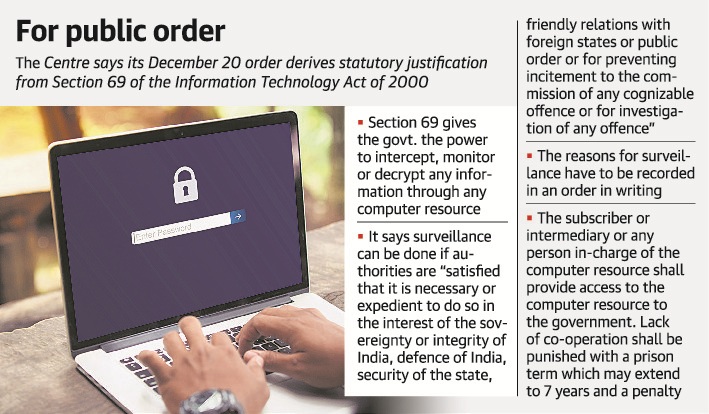
Order on surveillance meant to protect privacy, govt. tells SC
Why in news?
- The Centre told the Supreme Court on Friday that its December 20, 2018 notification allowing 10 central agencies to snoop on people is in fact a measure to protect citizens’ privacy.
More in news
Background:
- The government was responding to a PIL filed by advocate M.L. Sharma, challenging the December 20 notification as a violation of the fundamental right to privacy.
List of agencies:
- Intelligence Bureau (IB),
- Narcotics Control Bureau,
- Enforcement Directorate (ED),
- Central Board of Direct Taxes (CBDT),
- Directorate of Revenue Intelligence,
- Central Bureau of Investigation (CBI),
- National Investigation Agency Cabinet Secretariat (RAW),
- Directorate of Signal Intelligence (For service areas of Jammu & Kashmir, North-East and Assam only),
- Commissioner of Police, Delhi.
Law the order is based upon:
- Section 69 (1) of the Information Technology Act of 2000.
- Rule 4 of the Information Technology 2009 Rules (Procedure and Safeguards for Interception, Monitoring and Decryption of Information) Rules, 2009.
Government’s argument:
- Centre said the order, in fact, limits the power of surveillance to these 10 central agencies and none other.
- What has been done is in fact restricting the exercise of powers, removing vagueness and specifying the agencies who only would have the powers to utilise the powers of section 69 of the Act.
Surveillance is done as per due process of law:
- Any interception, monitoring, decryption of computer resource is done only by authorised agencies with approval of competent authority.
- To prevent unauthorised use of these powers by any agency, individual or intermediary so that the right to privacy of citizen is not violated.
Precautionary measures:
- There is no blanket permission to any agency.
- Permission for surveillance needs to be got from the Union Home Secretary.
- Besides, the law mandates the Centre and States to constitute a review committee with the Cabin
 SourceThe Hindu
SourceThe Hindu

